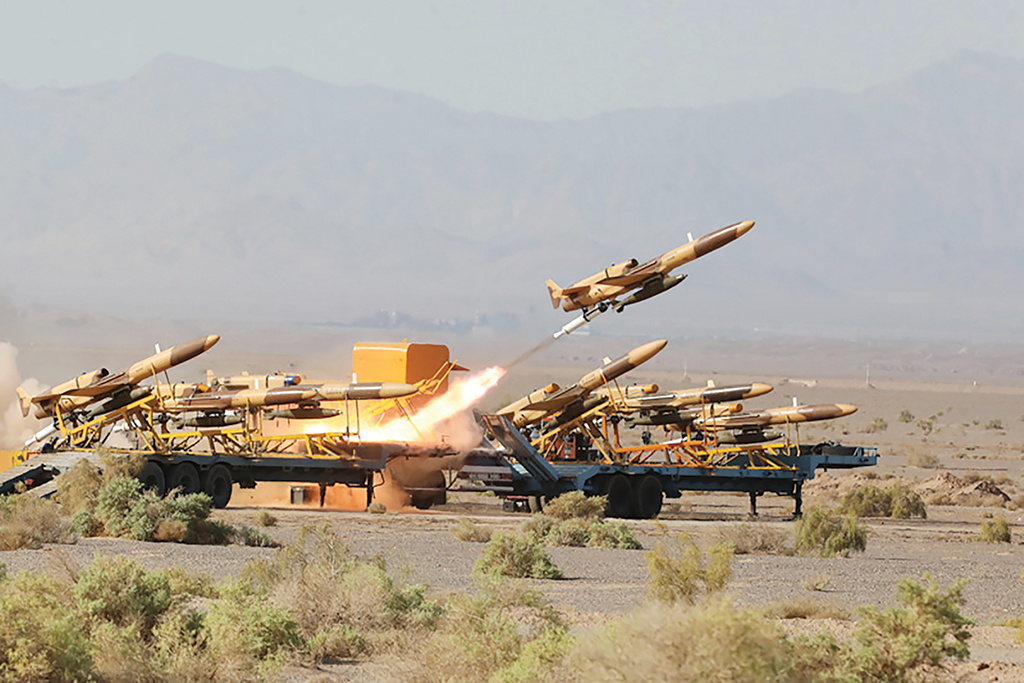TEHRAN: Iran has developed a hypersonic missile capable of penetrating all defense systems, General Amirali Hajizadeh, the commander of its Revolutionary Guards aerospace unit, claimed on Thursday. Hypersonic missiles, like traditional ballistic missiles which can deliver nuclear weapons, can fly more than five times the speed of sound. "This hypersonic ballistic missile was developed to counter air defence shields," Hajizadeh said, quoted by Iran's Fars news agency.
"It will be able to breach all the systems of anti-missile defense," said the general, adding that he believed it would take decades before a system capable of intercepting it is developed. "This missile, which targets enemy anti-missile systems, represents a great generational leap in the field of missiles." The announcement comes after Iran admitted on Saturday that it had sent drones to Russia, but said it had done so before the Ukraine war. The Washington Post reported on October 16 that Iran was preparing to ship missiles to Russia, but Tehran rejected the report as "completely false".
It also comes at a time of protests that have rocked Iran since the September 16 death of Mahsa Amini after her arrest for allegedly flouting the Islamic republic's dress code for women. Unlike ballistic missiles, hypersonic missiles fly on a trajectory low in the atmosphere, potentially reaching targets more quickly. North Korea's test of a hypersonic missile last year sparked concerns about the race to acquire the technology, which is currently led by Russia, followed by China and the United States.
Stalled nuclear talks
Both Iran and Russia are targeted by stringent sanctions-Iran after the US unilaterally pulled out of the 2015 nuclear deal, and Russia since it invaded Ukraine in February. The two countries have responded to the sanctions by boosting cooperation in key areas to help prop up their economies. Iran on Wednesday hosted Russia's security chief Nikolai Patrushev for talks on subjects that the Russian side said included "the fight against terrorism and extremism" as well as measures to counter Western interference.
A hypersonic missile is manoeuvrable, making it harder to track and defend against. While countries like the United States have developed systems designed to defend against cruise and ballistic missiles, the ability to track and take down a hypersonic missile remains a question. Thursday's announcement comes against a backdrop of stalled talks on reviving the 2015 nuclear deal.
The deal reached with six major powers-Britain, China, France, Germany, Russia and the US-gave Iran relief from sanctions in return for guarantees it could not develop an atomic weapon. Iran has always denied wanting a nuclear arsenal. The deal collapsed after the US's unilateral withdrawal in 2018 under then president Donald Trump. It also follows Iran's announcement on November 5 of the successful test flight of a rocket capable of propelling satellites into space.
Warning to Saudi Arabia
The United States has repeatedly voiced concern that such launches could boost Iran's ballistic missile technology, extending to the potential delivery of nuclear warheads. In March, the US government imposed sanctions on Iran's missile-related activities. It said at the time that the punitive measures followed "Iran's recent missile attack on Arbil, Iraq, as well as missile attacks by Iranian proxies against Saudi Arabia and the United Arab Emirates".
Iran on Wednesday warned its neighbors including Saudi Arabia that it would retaliate against moves to destabilize it amid the protests sparked by Amini's death. "I would like to say to Saudi Arabia that our destiny and that of other countries in the region are linked to each other," Intelligence Minister Esmail Khatib said. "Iran has so far adopted strategic patience but it cannot guarantee that it will maintain this strategic patience if hostilities against it continue.
"If the Islamic republic decides to punish these countries, their glass palaces will collapse and they will no longer enjoy stability," said Khatib. The minister has also warned Britain it would "pay" for harboring hostile Persian-language media reporting on the Amini protests. It came after the Revolutionary Guards were accused this week of issuing death threats against two journalists working for London-based Iran International television. The Saudi-linked channel's owner, Volant Media, said British police had warned them of "credible threats to their lives". - AFP











